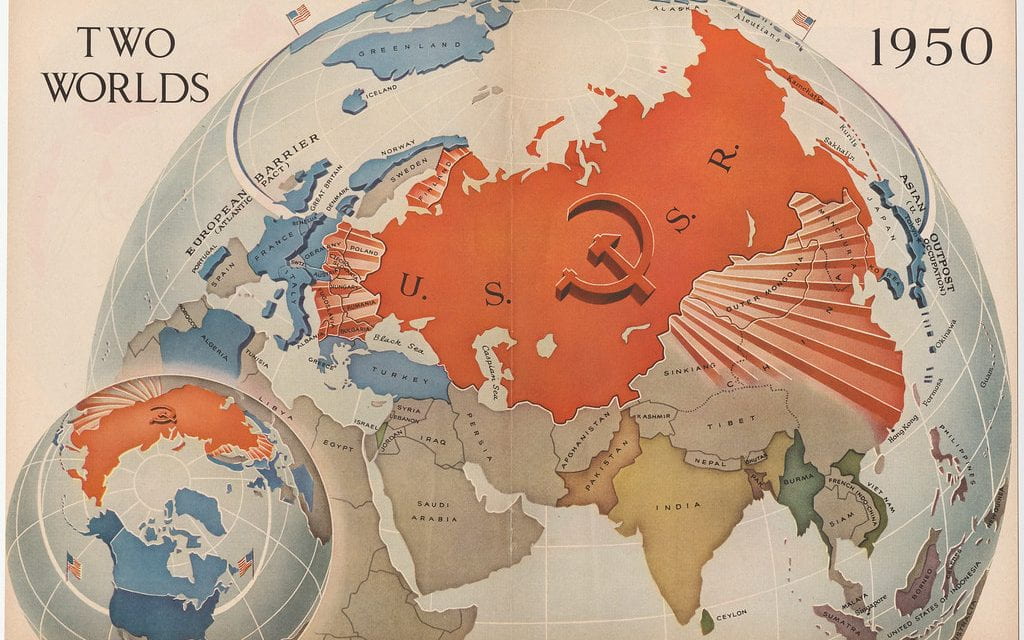The mid-20th century saw the Cold War rise out of the ashes of the most destructive armed conflict in history, the hasty alliance brokered between two titans crumbling a mere two years after the fall of Nazi Germany. Yet, as the East and West fought to expand their spheres of influence and nuclear tensions escalated, a very different kind of conflict was escalating in the ideoscape – a war of ideology.
The advent of the new medium of television allowed the spread of information on an unprecedented scale, and both American and Soviet-affiliated governments leapt on the opportunity to manipulate and control their sovereign cultural landscape. More than ensuring loyalty, 1950s propaganda symbolized the clash of ideologies that characterized the Cold War. The United States defined themselves as Christian and capitalist, with rigid roles for each unit of the nuclear family – in direct opposition to the Soviet ideals of communism, atheism, and a new social order founded (ostensibly) on equality for the working class. The Cold War played out in proxy wars and espionage, yes, but the vital battlefront was cultural – belligerent engines of ideas continuously spewing more aggressive ammunition to completely dominate over the other. No nation can survive unscathed once their legitimacy is in question; if you can convince the world that you are right, you have already defeated your enemy.
and both American and Soviet-affiliated governments leapt on the opportunity to manipulate and control their sovereign cultural landscape. More than ensuring loyalty, 1950s propaganda symbolized the clash of ideologies that characterized the Cold War. The United States defined themselves as Christian and capitalist, with rigid roles for each unit of the nuclear family – in direct opposition to the Soviet ideals of communism, atheism, and a new social order founded (ostensibly) on equality for the working class. The Cold War played out in proxy wars and espionage, yes, but the vital battlefront was cultural – belligerent engines of ideas continuously spewing more aggressive ammunition to completely dominate over the other. No nation can survive unscathed once their legitimacy is in question; if you can convince the world that you are right, you have already defeated your enemy.
The global ideoscape has changed a lot since then. For one thing, we have widespread access to high speed internet, allowing far quicker access to hot takes than the pundits of yesteryear could have dreamed possible. We are all soldiers of the ideological battlefield, flying our flags of allegiance with each like, share and subscribe. Even our memes betray our loyalty (see: anything from one of our party meme Facebook pages).
 The turbulence of the ideoscape, however, has remained very much the same. The contemporary crises of our collective memory – the 2008 Financial Crisis, the European Refugee Crisis, to name a few – have led to a peculiar cultural environment that has facilitated a resurgence of support for right-wing populism across the globe, most visibly in the US but also in Germany and Italy. We all know our Trumps, our Bolsonaros, appealing to those who feel left behind with promises of easy solutions to complex issues. Furious ideological skirmishes on immigration, protectionism and exclusion have come to dominate the politics of the early 21st century, threatening to jeopardize the advances in social justice made by our forebears. Again, conflict is emerging in the political landscape – one where combatants primarily define themselves not by their preferred economic system, but by whether or not they place the blame for our global malaise on “outsiders” and how they think they can solve it. The danger of this movement is that it “legitimizes humanity’s worst impulses”, a phrase used to describe Italian politician Matteo Salvini that I think applies to many of these recent political developments. The purely symbolic conflict of politics and ideology all too readily translates to violence in the physical world.
The turbulence of the ideoscape, however, has remained very much the same. The contemporary crises of our collective memory – the 2008 Financial Crisis, the European Refugee Crisis, to name a few – have led to a peculiar cultural environment that has facilitated a resurgence of support for right-wing populism across the globe, most visibly in the US but also in Germany and Italy. We all know our Trumps, our Bolsonaros, appealing to those who feel left behind with promises of easy solutions to complex issues. Furious ideological skirmishes on immigration, protectionism and exclusion have come to dominate the politics of the early 21st century, threatening to jeopardize the advances in social justice made by our forebears. Again, conflict is emerging in the political landscape – one where combatants primarily define themselves not by their preferred economic system, but by whether or not they place the blame for our global malaise on “outsiders” and how they think they can solve it. The danger of this movement is that it “legitimizes humanity’s worst impulses”, a phrase used to describe Italian politician Matteo Salvini that I think applies to many of these recent political developments. The purely symbolic conflict of politics and ideology all too readily translates to violence in the physical world.
One comment from our positive peace session is particularly relevant here – in the wake of the COVID-19 pandemic, there’s potential for our societies to tip either way, becoming more disrupted and insular, or more aware of the need for cooperation instead of ostracization. It seems that our role as active participants in the ideological debate is more important than ever, especially in this time of massive uncertainty. In order to make sure we end up on the right correct side of that divide, change must be wrought primarily through the spread of more powerful ideas – through education, conversation, and, yes, social media.
Bibliography
https://www.nyu.edu/classes/stephens/History%20of%20Television%20page.htm
https://www.bbc.com/news/world-europe-36130006
https://time.com/4504010/europe-politics-swing-right/
https://www.bbc.com/news/world-europe44921974
https://www.aljazeera.com/indepth/opinion/preparing-post-pandemic-world-200325132809404.html




